In this article
 8 Best Ways To Learn SQL
8 Best Ways To Learn SQL 1. Online SQL Tutoring
1. Online SQL Tutoring 2. SQL Courses
2. SQL Courses 3. Certifications for SQL
3. Certifications for SQL 4. Bootcamps to Learn SQL
4. Bootcamps to Learn SQL 5. YouTube Channels to Learn SQL
5. YouTube Channels to Learn SQL 6. Linkedin Learning
6. Linkedin Learning 7. Books to learn SQL
7. Books to learn SQL 8. SQL Projects
8. SQL Projects [8.1] Beginners: Library Management System
[8.1] Beginners: Library Management System [8.2] Intermediate: Social Media Network Database
[8.2] Intermediate: Social Media Network Database [8.3] Advanced: Real-time Stock Market Analysis Platform
[8.3] Advanced: Real-time Stock Market Analysis Platform About SQL: explained
About SQL: explained Features of SQL
Features of SQL Why learning SQL is essential for students and professionals
Why learning SQL is essential for students and professionals How do you improve your SQL skills?
How do you improve your SQL skills? Conclusion
Conclusion More SQL resources
More SQL resources Additional reads
Additional reads FAQs
FAQs
Looking to learn SQL from scratch, strengthen your skills, or refresh key concepts? This comprehensive ‘How to Learn SQL’ guide is here to help learners at all levels master the language.
- Master SQL with Confidence: Build a solid foundation in SQL and boost your data analysis and management skills using interactive resources and hands-on projects. Discover essential strategies to quickly improve your SQL knowledge.
- Explore Top SQL Resources: Access the best tutoring services, in-depth courses, engaging YouTube channels, and certifications tailored to various learning styles and career objectives, ensuring an effective and accessible learning experience.
- Get Tailored Support: Don’t go through SQL learning alone. Personalized tutoring offers the targeted help you need to overcome obstacles and speed up your progress.
Ready to level up in SQL? Book a free trial lesson with Wiingy today and enjoy personalized, flexible tutoring from expert SQL developers. Get the guidance you need to advance your data skills with sessions designed to fit your goals.
8 Best Ways To Learn SQL
The first step to learning SQL is to choose the right source. With plenty of methodologies available, settling on one source can be baffling. Here is a comprehensive list of all the learning sources for SQL:
| Learning Method | Recommended Age Group | Efficacy | Cost |
|---|---|---|---|
| 1. Online SQL Tutoring | All age groups (High School to Professionals) | High – Personalized support and targeted learning | Moderate – Typically $15-$65 per hour |
| 2. SQL Courses | High School to Professionals | High – Structured learning with expert guidance | Moderate to High – Usually $10-$100 per course |
| 3. SQL Certifications | University to Professionals | High – Provides official recognition and tests knowledge | Moderate to High – $32-$165 per certification |
| 4. SQL Bootcamps | University to Professionals | High – Intensive, fast-paced learning with hands-on projects | Moderate to High – $29.99 to $2,000+ |
| 5. YouTube Channels | High School to Professionals | Moderate – Self-paced learning with free tutorials | Low to Free – Free access to extensive video tutorials |
| 6. LinkedIn Learning | University to Professionals | High – Professional development with certifications | Moderate – Requires a subscription, typically $30/month |
| 7. SQL Books | High School to Professionals | High – Comprehensive coverage and self-paced learning | Low to Moderate – $10-$40 per book |
| 8. SQL Projects | University to Professionals | High – Hands-on experience to apply concepts in real-world scenarios | Low to Free – Project tools and resources can be free or low-cost |
1. Online SQL Tutoring
If you’re looking to learn SQL, private tutoring is the most ideal option. A qualified teacher’s tutoring would help you pick up fundamentals quickly. Here we’ll take a look at the top 3 tutoring services available for learning SQL:
[1.1] Wiingy

Wiingy provides 1-on-1 tutoring sessions, for concepts, projects, and assignment help. Tutors at Wiingy are experienced software developers having expertise in database development, and using SQL databases. Wiingy would help you master database design and manipulation. Students and parents have rated the Wiingy experience high. Moreover, Wiingy’s Co-Tutor AI application turns live lessons into engaging podcasts & review tools.

Wiingy maps you to an experienced SQL tutor catering to your learning requirements. Under Wiingy’s Perfect Match Guarantee Program, if you are dissatisfied with the tutor assigned, the tutor is replaced free of cost.
Key Specs:
- Free Trial: Yes
- Pricing: Starts at $15/hr
- Level: Beginners, Intermediate Learners, Advanced
[1.2] Wyzant

Wyzant is a 1:1 tutoring platform that provides SQL lessons online or in person. You can compare tutors, by their qualifications, ratings, and fees charged and chat with them for free before you decide to enroll. You will be charged the tuition fee only once you’ve attended the session. If you are not satisfied with your first lesson, no fee is charged for it.
Key Specs:
- Free Trial: No
- Pricing: $35/hr to $65/hr
- Level: Beginners, Intermediate Learners, Advanced
[1.3] Superprof

Superprof is a tutoring platform that lets you consult tutors free of cost, express your needs, and discuss the availability of tutors. Superpof helps you find your ideal tutor based on criteria such as price, qualification of a tutor, and reviews, online or offline. The Superproof’s incredible Student Pass gives you unlimited access to all tutors, coaches, and master classes.
Key Specs:
- Free Trial: 97% of teachers offer their first lesson for free.
- Pricing: Starts at $15/hr
- Level: Beginners, Intermediate Learners, Advanced
Looking for focused, one-on-one guidance? Wiingy’s expert SQL tutors can help you master SQL with personalized sessions.
2. SQL Courses
Courses provide a structured curriculum, transitioning from basic to advanced levels. They provide regular feedback and evaluation which helps learners track their progress. If you are looking for an interactive and flexible learning method SQL Courses are the way to go. The top interactive SQL courses to enhance your learning are listed below:
[2.1] [Coursera] Introduction to Structured Query Language (SQL)

It is a 4-module course that works through PHP and SQL installation steps. The course covers the basic syntax of SQL and database design to model relationships between entities. The modules consist of videos, reading material, and quizzes. The course helps you develop job-relevant skills through industry experts.
Key Specs:
- Duration: 15 hours (You can learn at your own pace)
- Level: Intermediate (Some related experience required)
- Certificate: Available
- Rating: 4.8
[2.2] [Udemy] The Comprehensive SQL Course

The course equips the learner with in-demand skills in data analysis and the business sector. The course includes everything from installation of MySQL to Transaction Control Language. The language learned from this course can be applied across all Database Management Systems such as Oracle and Microsoft SQL Server. Complex sections of SQL are backed by coding challenges and assignments.
Key Specs:
- Duration: 9.5 hours
- Level: Beginners
- Certificate: Available
- Rating: 4.7
[2.3] [Udacity] Introduction to SQL
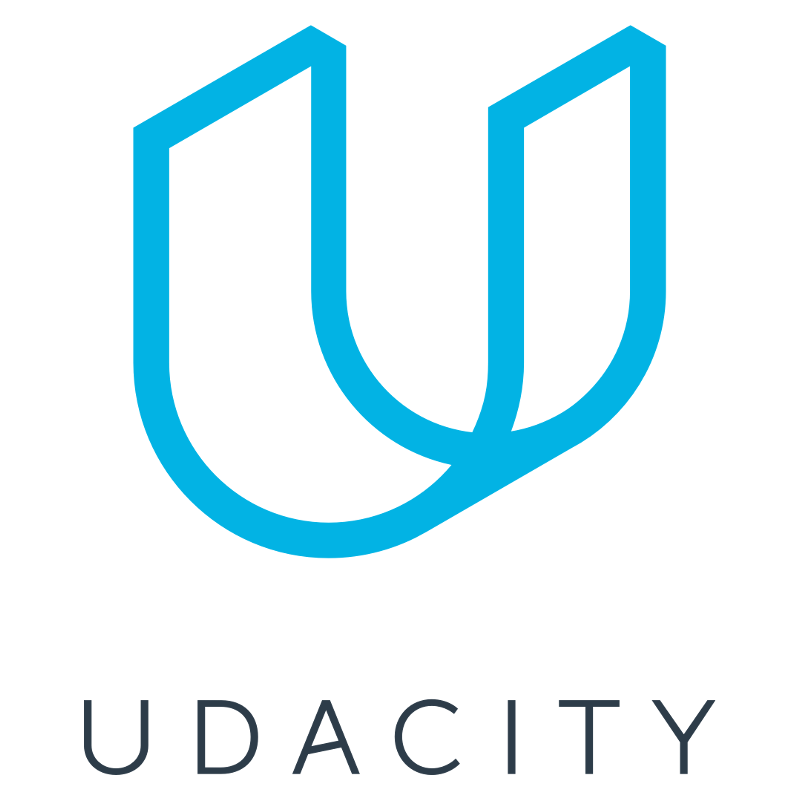
The 10-lesson course deals with SQL subqueries, SQL joins, SQL aggregations, SQL window functions, SQL queries, Data cleaning, and SQL query performance tuning. The course does not require you to have prior coding experience. All the teachings are backed by real-world projects. Reviewers provide timely and constructive feedback on the learner’s project submission, highlighting areas of improvement.
Key Specs:
- Duration: 4 weeks
- Level: Beginners
- Certificate: Available
Need more personalized attention while taking courses? Wiingy’s private SQL tutoring complements online courses, offering real-time support.
3. Certifications for SQL
Certifications are bona fide proof of your knowledge of the subject. It is essential even for an experienced developer to have certifications to secure a job. Apart from providing official proof, these certifications test your knowledge and make you aware of your strengths and weaknesses.
Some of the most popular certifications in SQL are listed below:
[3.1] Oracle Database SQL Certified Associate Certification
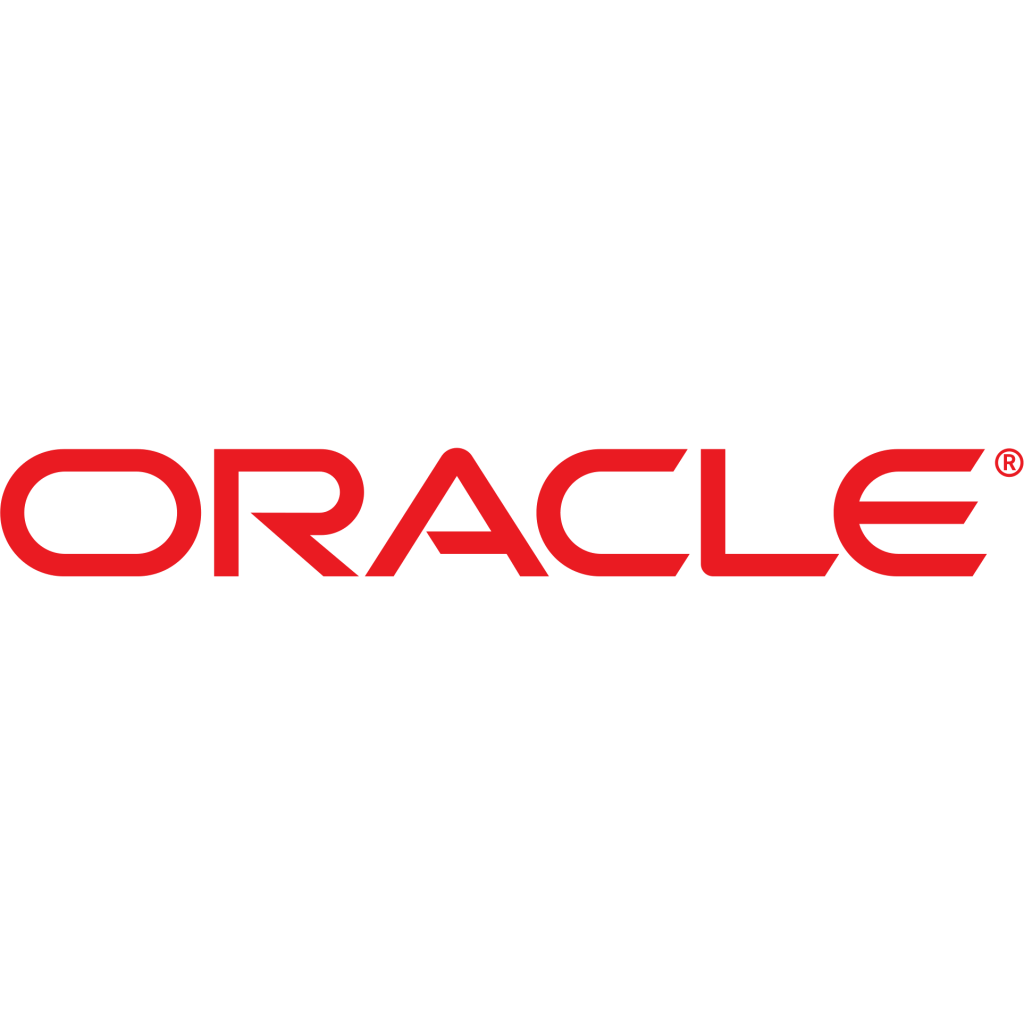
The course acquaints you with the Oracle Database server. You will learn how to manage, indexes, synonyms, sequences, and tables using DML statements. Passing the test proves a thorough understanding of SQL. The course equips you with skills to create and manipulate tables in an ORACLE database and data modeling.
Key Specs:
- Format: Multiple Choice
- Duration: 120 minutes
- Number of Questions: 63
- Passing Score: 63%
[3.2] Microsoft Certified: Azure Database Administrator Associate
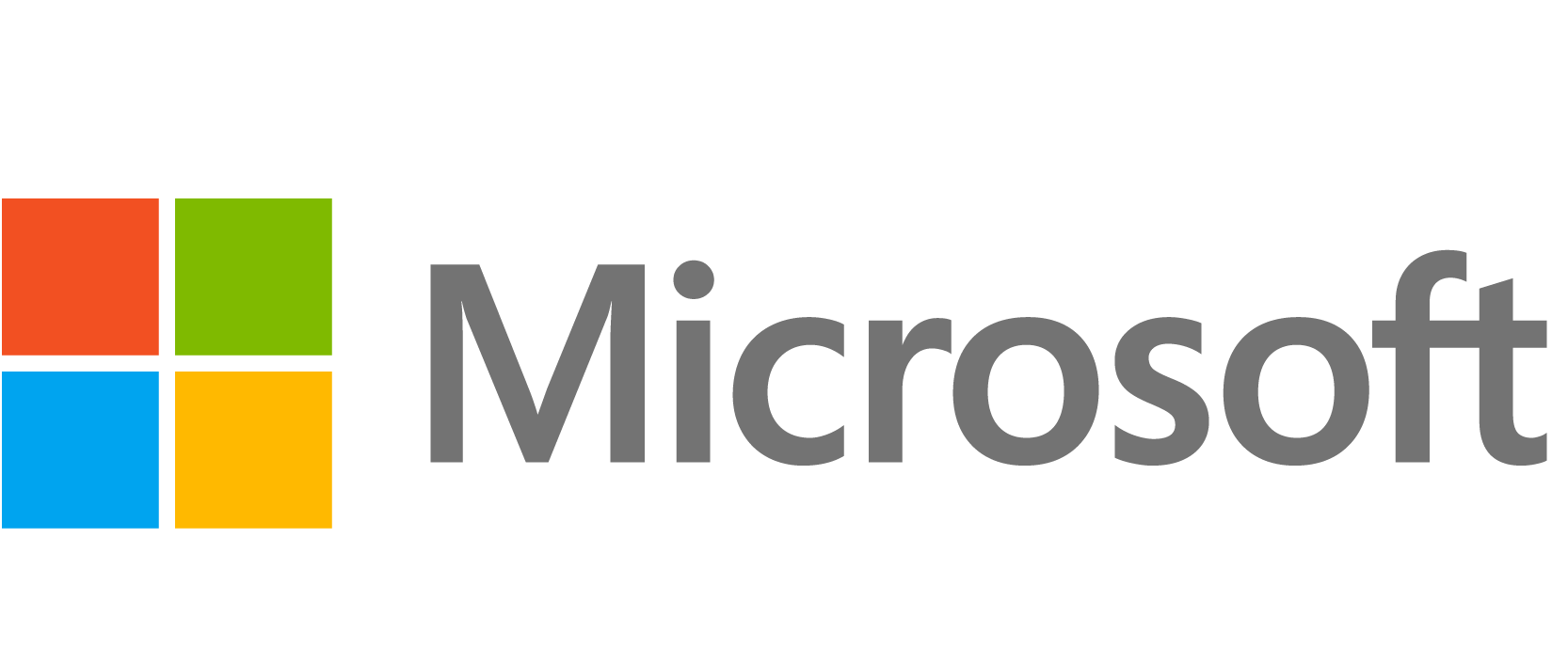
The certificate requires you to know Azure SQL Database and SQL Server on Azure Virtual Machines (Windows and Linux). The course trains you in implementing a secure environment for SQL, and automated databases for SQL. In case you fail you can retake the exam 24 hours after the first attempt. You get to work with Azure data engineers, and Azure solution architects to manage the operational aspects of data platform solutions.
To protect exam security, the format of questions isn’t made available before the exam.
Key Specs:
- Price: $165 USD
- Duration: 100 minutes
- Number of Questions: 40-60
[3.3] [Coursera] Managing Big Data with MySQL

This course is part of the Excel to MySQL: Analytic Techniques for Business Specialization. The 6-module course covers relational databases, queries to extract data from single tables, summarise groups of data from multiple tables, and address more detailed business questions. The course is offered by Duke University and hence the certification holds significant value.
Key Specs:
- Cost: $32 USD
- Duration: 32 hours
- Rating: 4.7
To know more about the best SQL Certifications, head over to our blog!
Struggling to prepare for certifications? Wiingy’s expert-vetted SQL tutors can guide you through the certification process with personalized support.
4. Bootcamps to Learn SQL
An accelerated, targeted training would greatly benefit people looking to learn JavaScript. Bootcamps help learn JavaScript in a sped-up way especially if you are looking to transition from your career background. It is a budget-friendly alternative and the curriculum satisfies the continuous technological advancements in the field.
[4.1] [Udemy] The Complete SQL Bootcamp: Go from Zero to Hero

The Bootcamp ramps up your SQL learning process drastically. You will learn SQL primarily to perform data analysis. Two world’s most popular SQL tools- PostgreSQL and PgAdmin are covered in the course. The boot camp does not require you to have any prior technical experience. Post completion, you will be confident enough to add SQL and PostgreSQL to your skillsets on your resume.
Key Specs:
- Price: $29.99
- Duration: 8h 51m
- Level: Beginners
- Certificate: Available
- Rating: 4.6
[4.2] Le Wagon (Part-Time) Data Engineering Course

The bootcamp will help you master Data Engineering, Database Management, and Data Storage. To get the most out of the boot camp, 40 hours of preparation work is required. You will learn GitHub and Git in detail along with Python and SQL by practicing on real-life tech projects. The bootcamp provides career coaching to help you land your dream job.
Key Specs:
- Duration: 2 months (Full-time)
7 months (Part-time)
- Level: Beginners
- Certificate: Available
- Rating: 4.9/5
[4.3] [DataScienceDojo] Data Science Bootcamp
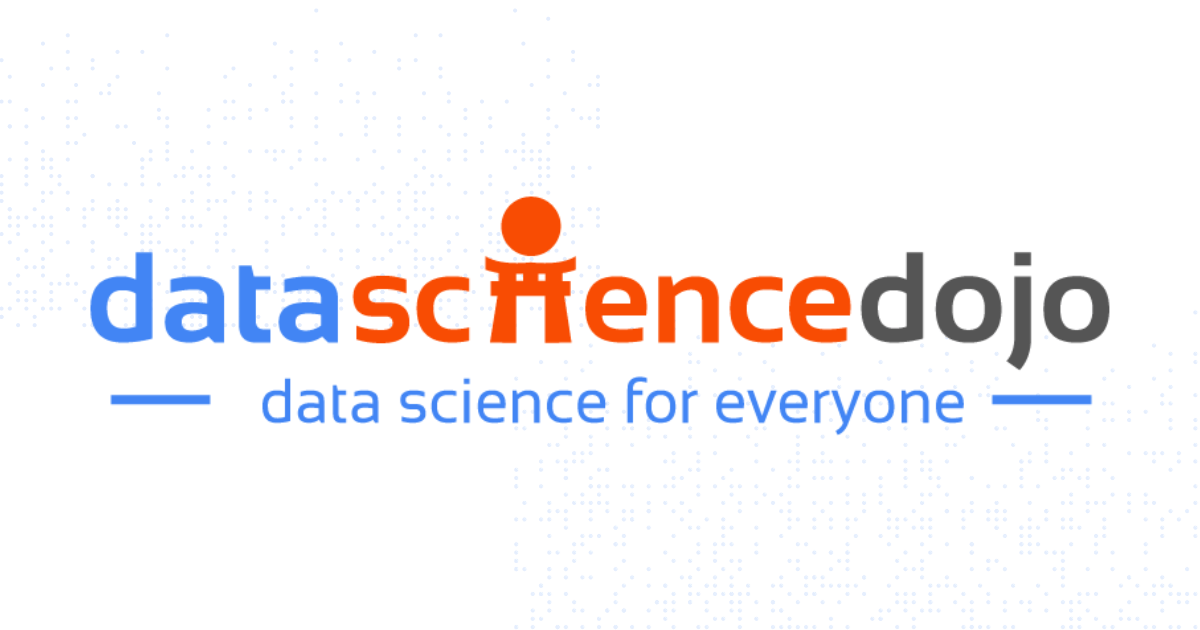
The bootcamp exposes you to the best practical exposure in the world of data science, programming, and machine learning. It provides you with a hands-on coding environment for you to practice coding anytime and anywhere to master your skills. The bootcamp equips the learner with a rich repository of resources for future reference.
Key Specs:
- Duration: 16 weeks
- Level: Intermediate
- Certificate: Available
To know more about the best SQL Bootcamps, head over to our blog!
Looking for an affordable alternative to bootcamps? Wiingy offers personalized SQL tutoring tailored to your pace and learning needs.
5. YouTube Channels to Learn SQL
YouTube channels help learners save money, time, and energy which helps them employ their resources more efficiently. YouTube is the best source to learn SQL free of cost.
Some of the famous YouTube channels that have helped learners all over the world learn essential SQL coding skills are listed below:
[5.1] Kudvenkat Youtube

The YouTube channel focuses primarily on non-programming people. The videos consist of informative PowerPoint slides with live coding on Microsoft Visual Code. The channel provides transcripts of the video along with .Net, and Sql server video tutorials. The videos are highly beneficial for people looking to become .NET developers.
About the channel:
- Joined: Nov 27, 2008
- Views: 260,395,003 views
- Subscribers Count: 827K subscribers
- No. of Videos: 1,853 videos
- Average Duration of Videos: 25-30 minutes
- Based In: United Kingdom
[5.2] Alex The Analyst
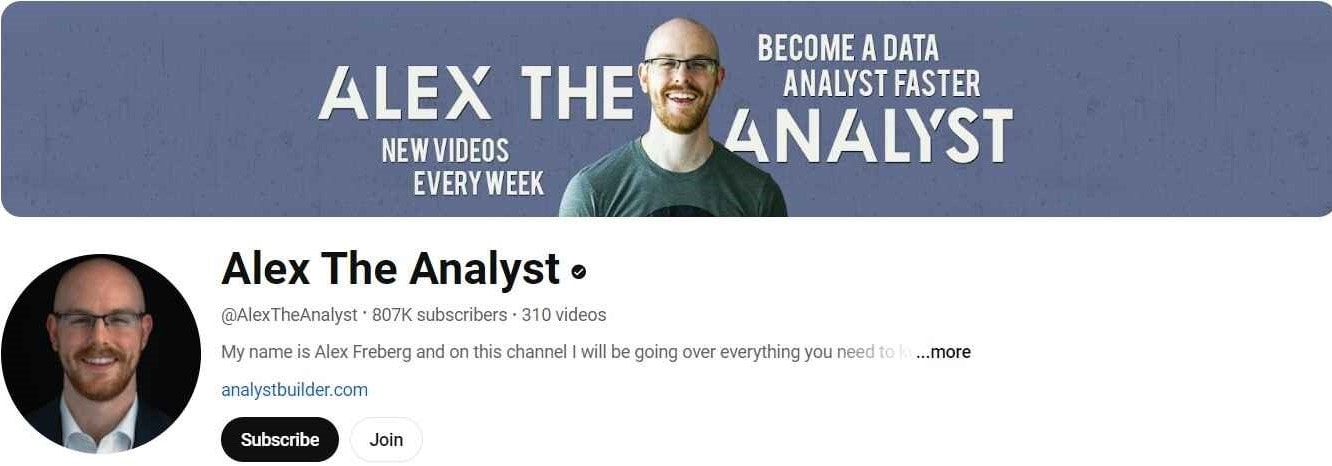
The channel is run by Alex, a Data Analyst well-versed in SQL, Python, Tableau, and Power BI. The course equips you with the basic skills needed to become an Analyst. Alex has a separate SQL playlist series for beginners, intermediate, and advanced learners covering topics like Union Operators, Case Statements, and Partition By. This is the ideal choice for self-paced learners looking to enter Data Analytics.
About the channel:
- Joined: Jan 8, 2020
- Views: 35,668,355 views
- Subscribers Count: 798K subscribers
- No. of Videos: 308 videos
- Average Duration of Videos: 45-50 minutes
- Based In: United States
[5.3] freeCodeCamp
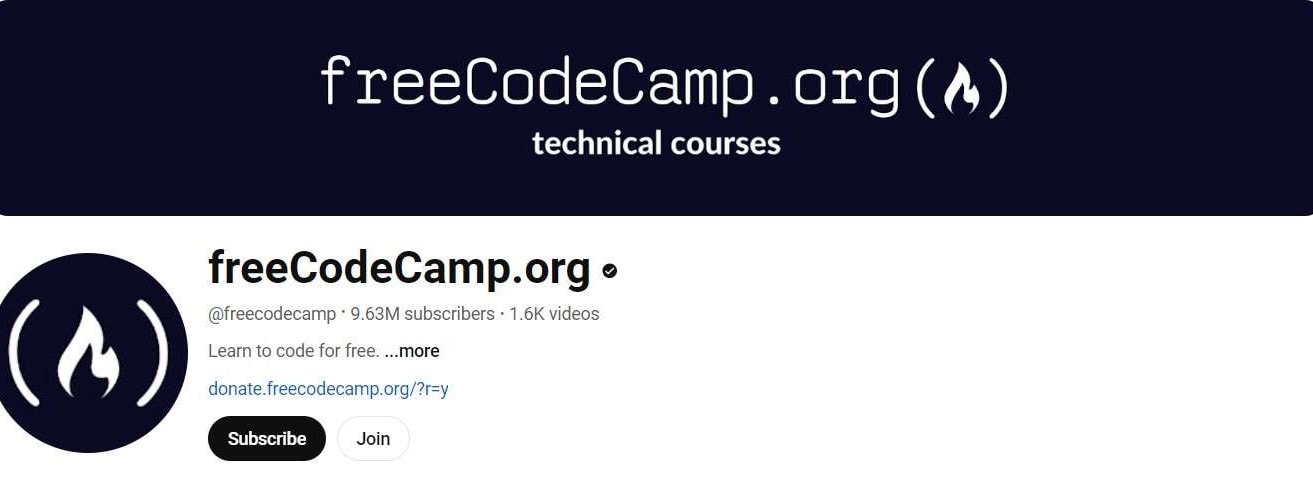
The 4 hour-long video tutorial is a free beginner’s guide to SQL. The course is designed for absolute beginners following the curriculum at freecodecamp.org.
The course is well structured with every lesson backed by real-world applications. The course covers schema design, and basic C.R.U.D operations, aggregation, nested queries, joins, and keys. The channel is run by the freeCodeCamp.org, a non-profit organization that aims to help people learn code free of cost.
About the channel:
- Joined: Dec 17, 2014
- Views: 729,058,247 views
- Subscribers Count: 9.63M subscribers
- No. of videos: 1,687 videos
- Based In: United States
Want more personalized help beyond YouTube tutorials? Wiingy’s SQL tutors provide live, one-on-one assistance to accelerate your learning.
6. Linkedin Learning
LinkedIn Learning is an impactful way of learning SQL and making your resume competent at the same time.
The courses can be accessed on phones or tablets and the certification can be showcased on your LinkedIn profile under the “License and Certificates” section. This adds credibility to your skills and improves the prospects of your profile being noticed.
Some of the popular LinkedIn courses for SQL are:
[6.1] Master SQL for Data Science

SQL is the standard language for Data Analysis. The Master SQL for Data Science is an Intermediate to Advanced level course. At the end of each tutorial, coding challenges and Chapter Quiz are available to help you keep track of your progress.
Each tutorial helps you take your skills to the next level. The course comprises 5 tutorials namely:
- SQL: Data Reporting and Analysis: The course deals with writing simple queries including merging, grouping, and relabeling data.
- Intermediate SQL: Data Reporting and Analysis: The course involves data manipulation (editing, inserting, and deleting). New functions like string, number, and date are introduced.
- Advanced SQL for Data Scientists: The course discusses the logical and physical design of tables, indexes, and query optimization.
- Advanced SQL for Query Tuning and Performance Optimization: The course deals with how SQL executes a Query, Types of Indexes, and Partitioning Data.
- Advanced SQL for Data Science: Time Series: The course gives you an insight into how to model Time Series data using SQL constructs.
Course Outline:
- Duration: 10h 43m
- Level: Intermediate
- Rating: 4.6 out of 5
[6.2] Explore a Career in SQL Development

The course is a consolidated program that takes the individual from learning basic SQL to preparing them with the required skillset for landing a job. The course comprises 7 tutorials namely:
Choosing a Database: PostgreSQL, MySQL, Mongo, and Cloud: This course introduces you to several cloud-based databases like PostgreSQL, MySQL, and Mongo helping you choose one.
SQL Essential Training: The course deals with the basic structure of a database, discovering insights into data, and accessing data from multiple tables. The course consists of Code Challenges powered by CoderPad, which helps the learner get hands-on experience.
SQL Queries Made Easy: The course covers topics like Transaction Control, and Data Definition Language. The instructor demonstrates how to create, drop, rename, and truncate tables, and manipulate data. All the teachings are backed by a Chapter Quiz at the end of the module.
SQL Server Intelligence: Cracking the Code of Enterprise Data: The course explores various syntaxes to filter data on more than one condition and analyze data with flexibility, efficiency, and calculated fields. It discusses top SQL queries like WHERE, IN, BETWEEN, AND, OR.
SQL for Data Analysis: The course acquaints you with relational databases, common SQL String, and aggregate Functions for Data Analysis. The course helps you incorporate SQL queries into Jupyter Notebook for Data Visualization. The course encompasses GitHub Codespaces, where you can get hands-on coding experience
Nail Your SQL Interview: The coursework aims to prepare you for SQL interviews by helping you get acquainted with common SQL questions, tips, and industry-specific guidelines. Some frequently asked questions revolve around querying the table with logical operators like LIKE, IN, and BETWEEN.
Finding New Career Paths with SQL: The course introduces you to the career paths that learning SQL opens for you. It focuses on multiple career paths like Analytics, Data Science, and Engineering.
Course Outline:
- Duration: 11h 58m
- Level: Intermediate
- Rating: 4.5 out of 5
Need help mastering LinkedIn Learning courses? Wiingy’s expert SQL tutors offer personalized guidance to help you excel.
7. Books to learn SQL
SQL Books provide comprehensive knowledge about the programming language. The topics are structured in a way, that helps in a smooth transition from basics to advanced topics. Books can be used for reference whenever needed, and allow self-paced learning.
[7.1] SQL for Data Scientists: A Beginner’s Guide for Building Datasets for Analysis
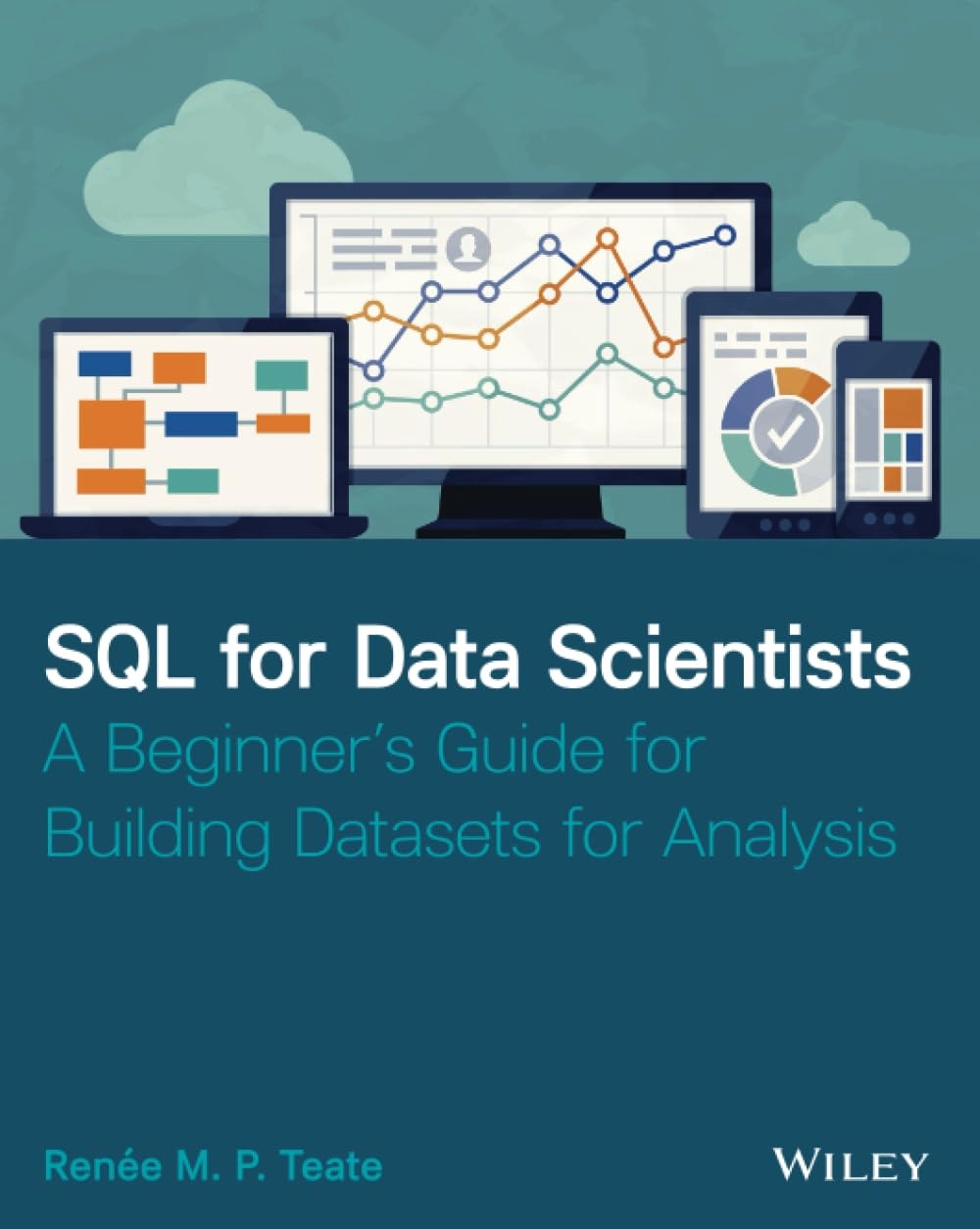
The book is targeted towards aspiring data scientists. The book is written by Rebee Teate who’s career trajectory has varied from database developer to data analyst. She focuses on instructing how to build datasets for machine learning. The book covers all the essential skills needed for retrieving datasets from a relational database using SQL, developing queries to construct datasets, and reviewing strategies to design analytical datasets.
[7.2] T-SQL Fundamentals
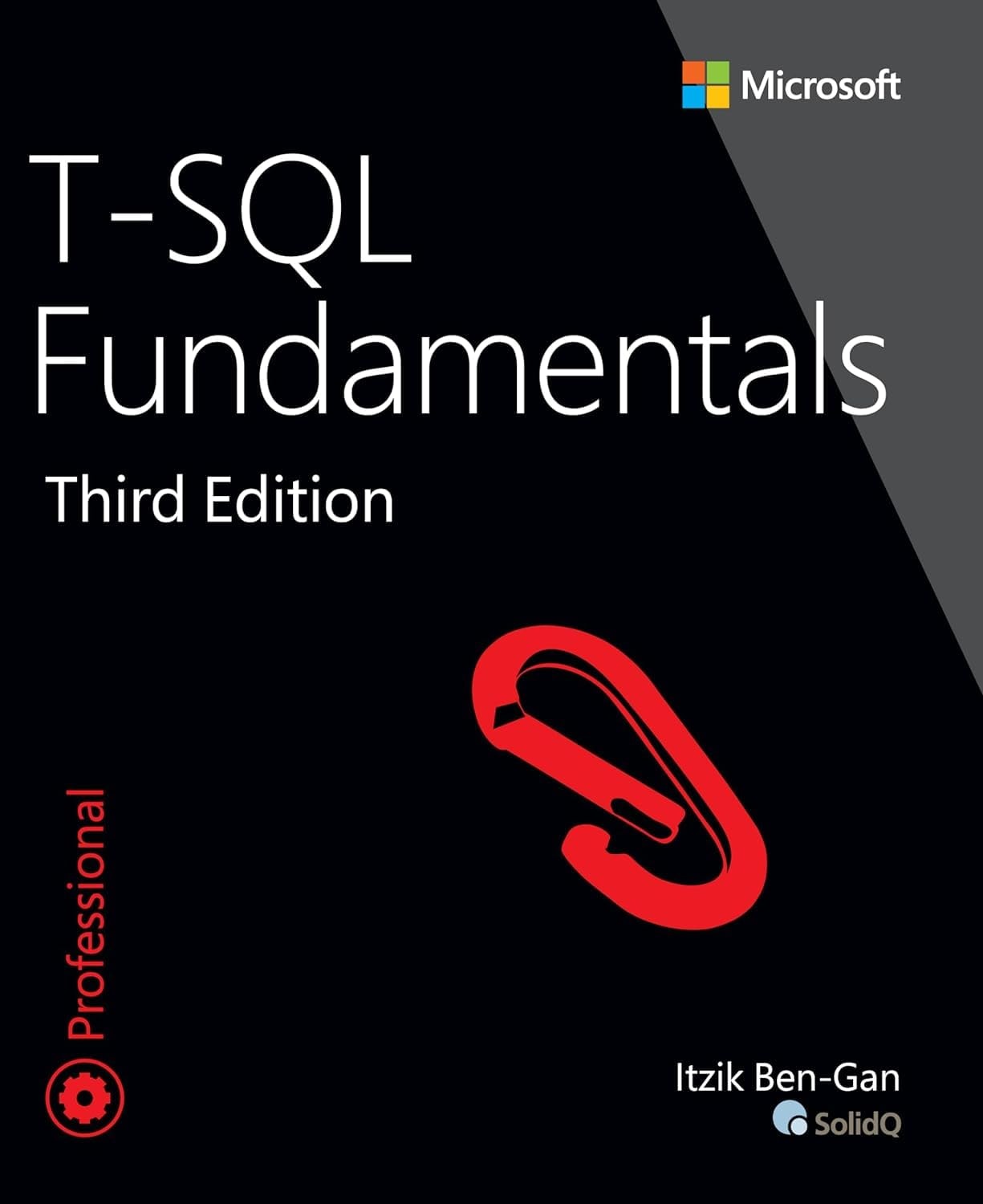
The book offers a comprehensive coverage of T-SQL fundamentals mainly single table queries, joins, subqueries, table expressions, and set operators.
The book addresses the techniques for writing robust code for Microsoft SQL Server and Azure SQL Database. It tackles advanced query techniques such as window functions, pivoting, and grouping sets.
[7.3] SQL in 10 Minutes, Sams Teach Yourself
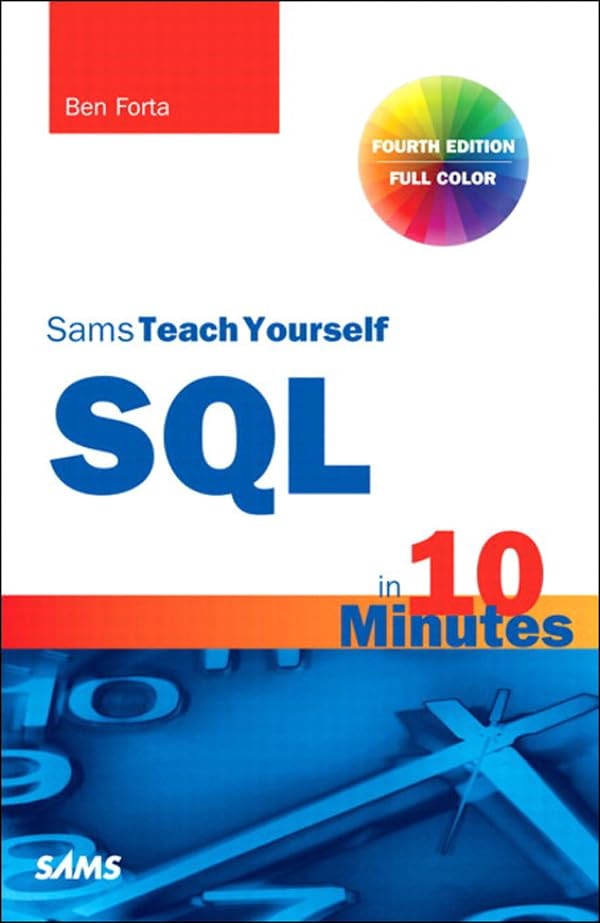
The book comprises 22 short, quick lessons that take only 10 minutes to complete. The book covers the latest versions of IBM DB2, Microsoft Access, Microsoft SQL Server, MySQL, Oracle, and SQLite. It will give you a comprehensive idea of major SQL statements, and the construction of complex SQL statements using various clauses, wildcards, and advanced data filters.
Want hands-on support alongside reading? Wiingy’s private SQL tutoring pairs perfectly with self-study for deeper learning.
8. SQL Projects
Once you are thorough with the fundamentals starting a project will help you gain a deeper insight into the language. While making a project you’d encounter multiple queries. In resolving these, you’ll learn new debugging methods and get clarity on the concepts.
To be proficient you need hands-on experience in SQL and the most efficient way to do so is to create projects and apply all the SQL skills you have learned. Below are the best suitable projects for beginners, intermediate, and advanced levels:
[8.1] Beginners: Library Management System

The library management system is a tool that helps librarians or store owners keep track of the books that are borrowed and returned. It works like a digital notebook where they can store information about the users who borrow and return these books, as well as the details of the books.
The system is easy to use – all you have to do is enter the information into the system, and it will be stored in a database. From there, you can use simple search functions to find the information you need, or you can run more complex queries to get detailed reports on users and the books they have returned and borrowed, as well as book details.
[8.2] Intermediate: Social Media Network Database

The social media database tracks the multitude of users that log in/signup for social media. It stores the user details, along with their list of followers and connections. If we take it further we can also add a table for the list of preferences of posts of a user and map them using joins.
[8.3] Advanced: Real-time Stock Market Analysis Platform

A real-time stock or bond quote is one that states a security’s most recent offer to sell or bid (buy). Different from a delayed quote, which shows the same bid and ask prices 15 minutes and sometimes 20 minutes after a trade takes place. It is a platform used to display the stock information in real-time
To know more about the best SQL Projects, head over to our blog!
Need expert guidance while working on SQL projects? Wiingy’s top SQL tutors provide personalized feedback to sharpen your skills.
About SQL: explained
SQL (Structured Query Language) is a domain-specific language. The most widely used Database Language, SQL is used to communicate with a database. It stores data in the form of tables and is known for handling structured data – data in which entities and variables are correlated.
Initially called SEQUEL (Structured English Query Language) it was developed at IBM by Donald D. Chamberlin and Raymond F. Boyce. A Declarative Programming Language, SQL standard defines 3 kinds of data types:
- Predefined data types
- Constructed types
- User-defined types
In 1986, SQL became a standard of the American National Standards Institute (ANSI) and of the International Organization for Standardization (ISO) in 1987.
Features of SQL
Relational Database Management System is the basis for all modern database systems: MySQL, Microsoft SQL Server, Oracle, and Microsoft Access. Some notable features of SQL that make it significant in the database field are:
Clauses: SQL has various clauses like select, from, where, group by, having, join, union, and delete to delete data and data manipulation.
Expressions: SQL has Arithmetic, String Expressions, Date Functions and Case Expressions for performing mathematical and logical operations.
Predicates: SQL has predicates like Comparison, Logical, IN, LIKE, and NULL for performing matching, testing null values, and comparing values.
Queries: Queries are used to reference columns, and retrieve data from a table. SQL Queries used for performing these are SELECT Query and Correlated Queries.
Statements: SQL has various statements for data manipulation and managing access to data like DDL (Data Definition Language), DML (Data Manipulation Language), DCL (Data Control Language), TCL (Transaction Control Language). All these statements make SQL a powerful tool for data management and analysis.
Portable: A limited set of data types are portable across databases but few SQL codes written on one database management can be used on another system with minimum modifications.
Why learning SQL is essential for students and professionals
SQL is used to analyze data and find trends and valuable statistical insights. Here we have curated a list of all the high-paying jobs that require fluency in SQL:
1. Data scientist
2. Data analyst
3. Business analyst
4. Quality assurance engineer
5. SQL developer
6. SQL developer
7. Database administrator
How do you improve your SQL skills?
Learning any programming language requires consistent coding practice and a solid understanding of logic and syntax. SQL can be approached by working on your concepts, working on real-time projects, joining communities of like-minded developers, and constantly updating yourself with changing technologies in the field.
Here are a few tips to improve your SQL skills:
– Work on SQL basics: Before you start coding, make sure you are well-versed in the basic SQL concepts.
– Code Regularly: Write SQL queries regularly on websites like leetcode, SQLZoo, SQL Bolt, and Mode. These websites prepare you for technical interviews, and let you test, debug, and write your projects online.
– Work on Real-time projects: Regularly engaging in SQL projects is a great way to reinforce your skills and learn through practical experience. Personal or collaborative projects help you apply concepts and solve real-world challenges. This is where Wiingy can help!

Partnering with a Wiingy SQL tutor provides expert guidance and personalized feedback during your projects. With a tutor’s support, you can overcome obstacles efficiently and accelerate your learning progress.
Even if you are struggling with intro to programming, Wiingy’s 1-on-1 tutoring can help you solidify your own understanding while guiding other coding languages.
– Regular Optimizing: You can constantly incorporate emerging technologies in your projects to drive growth. As soon as a new library is introduced try to incorporate it into your old code.
– Debugging: “Developers debug the codes more than running”. You should practice debugging SQL code to trace and fix errors. Finding bugs in the logic assists in a better understanding of the program structure. Debugging facilitates a clearer perception of the program architecture.
– Community Engagement: Stack Overflow and Reddit are great places to join communities, and interact with experienced SQL learners. On these platforms, you can pick techniques from some of the most skilled developers from all over the world.
Conclusion
For mastering SQL, there are various learning methods to suit different needs, but online tutoring stands out as the most effective option.
- Online SQL Tutoring offers personalized, one-on-one support, helping learners tackle specific challenges with real-time guidance. This tailored approach ensures faster progress and deeper understanding of complex concepts—find top SQL tutors on Wiingy!
- SQL Courses provide structured learning with expert guidance, ideal for self-paced learners. While they offer clear, step-by-step content, they may lack the personalized feedback necessary for resolving specific challenges.
- SQL Certifications are a valuable way to validate your SQL skills. They not only test your knowledge but also provide official proof of proficiency. However, they often require significant investment and self-study discipline.
- SQL Bootcamps deliver fast-tracked, hands-on learning with practical applications. These immersive programs can drastically improve your SQL skills in a short time but typically come at a higher cost.
- YouTube Channels offer free, easily accessible tutorials that are perfect for independent learners. However, they lack the interaction and tailored guidance that live support can provide.
- LinkedIn Learning is an excellent resource for professionals, focusing on real-world applications and offering certifications that can boost your resume. However, it may not provide the deep, personalized attention needed for overcoming specific learning obstacles.
- SQL Books are great for in-depth, self-paced learning, offering comprehensive coverage of SQL topics. Yet, they may not provide the interactive or hands-on guidance often required for truly mastering the material.
- SQL Projects give you the hands-on experience necessary to apply your SQL knowledge in real-world scenarios. However, feedback from a mentor or tutor can significantly enhance your learning and troubleshooting abilities.
Ready to master SQL? Book a free trial lesson with Wiingy today for customized, expert tutoring!
More SQL resources
12 Best SQL Bootcamps
15 Best SQL Projects
12 Best SQL Certifications
Additional reads
How to Learn Java
How to Learn Python
How to Learn C++
How to Learn JavaScript
How to Learn Coding
How to Learn French
FAQs
How can online SQL tutoring help me learn SQL quickly?
Online SQL tutoring offers personalized, one-on-one instruction tailored to your learning style and pace, helping you grasp difficult concepts more efficiently. This targeted approach can significantly reduce learning time, making it one of the most effective ways to learn SQL fast.
Ready to accelerate your SQL learning? Book your lessons with expert SQL tutors today!
What are the best SQL resources to complement online tutoring?
The best SQL resources include online courses, books, projects, and hands-on practice. However, pairing these with online SQL tutoring ensures you get real-time feedback and guidance, allowing you to deepen your understanding and apply what you’ve learned more effectively.
Want the best SQL learning experience? Get personalized guidance from top SQL tutors now!
What are some effective SQL learning tips to master the language fast?
To learn SQL quickly, focus on consistent practice, work on real-time projects, and use online SQL tutoring to get expert guidance. Regular coding, paired with professional support, will sharpen your skills and help you master SQL faster than self-study alone.
Looking for effective SQL learning? Work with expert SQL tutors and start mastering SQL today!
How long does it take to learn SQL?
Learning SQL depends on your prior experience with programming. If you are completely new to programming, it may take you 3-4 weeks to grasp the basics of SQL. For people starting from scratch, it might take at least 2 months to be proficient.
If you already have experience with programming languages, you will grasp the basics in a week. It will take a maximum of 3-4 weeks to attain proficiency in JavaScript.
How to learn SQL for free?
YouTube Channels are the best source to learn SQL for free. Channels like freeCodeCamp, Kudvenkat Youtube, and Alex the Analyst have extensive SQL tutorials for beginners and advanced learners. Another extremely valuable resource to learn SQL for free is freeCodeCamp a nonprofit organization that aims to teach coders free of cost. It has extensive SQL web tutorials and YouTube videos for learners.
Some of the free bootcamps and courses available that include SQL teaching:
freeCodeCamp
Codecademy
App Academy Open
3. Can I self-learn SQL?
Yes, you can self-learn SQL. Follow a structured learning technique, refer to books like “SQL for Data Scientists: A Beginner’s Guide for Building Datasets for Analysis” and “SQL in 10 Minutes, Sams Teach Yourself”. Regularly take up coding challenges on SQLZoo, SQL Bolt and Mode to asses yourself. freecodecamp and w3schools have extensive web tutorials explaining basic to advanced-level topics.
4. Is SQL hard to learn?
SQL is considered one of the easiest programming languages. Since SQL is a declarative language, it is comparatively easy to learn and comprehend. The syntax resembles natural language and is straightforward making the language easy to grasp.

Jan 03, 2026
Was this helpful?





